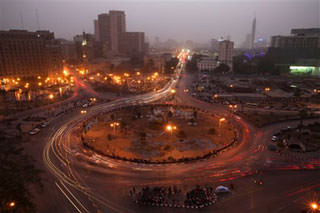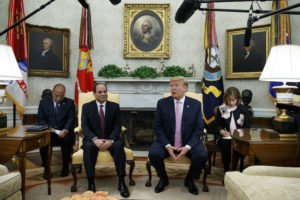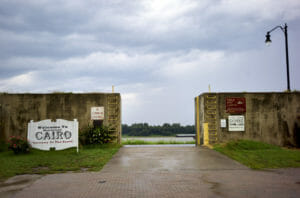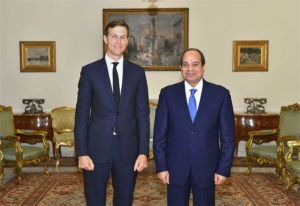Dispatches From Cairo: The Prophet’s Birthday
Most Egyptians were prejudiced against themselves. This revolution gave them pride and purpose and reminded them how great the Egyptian people are.
Editor’s note: We have asked Lauren Unger-Geoffroy, an Arabic-speaking American who lives in Cairo, to share her perspective of life in Egypt after the revolution. The following letter is from Tuesday, the birthday of the Prophet.Tuesday, Feb. 15
Today is the Prophet’s birthday. A public holiday, a day of reflection and good-deed doing, not an intensely religious holiday, but it is a reminder that there are sociological elements that must be understood before trying to assess the situation in Egypt from the outside.
Egyptians are an emotional people — they function on an empathic level. They are very sensitive to their own sense of self. That’s more important to the formation of the future of the Egyptian people than your pragmatic colonialist ideas.
For 30 years, their sociopolitical immobility, enforced by the media and the mandarin-like elite, has been filling their minds with the idea that Egyptians are poor and lazy people who do not want to work … selfish and undisciplined, only be governed by the stick. … That the Egyptian people are not ready for democracy, just a mass of dirt-living, penny-grubbing Third-Worlders. They accepted this image of themselves and lived their lives accepting God’s will in a constant gray despair and depression waiting for the next, better life in heaven. Imagine how many ideas were not published via the mass and national media, an accomplice in an ocean of ignorance, poverty and disease for three decades. But what happened here in Tahrir Square is a true legend for the People of the Pharaoh, delivered from their lowly status
The demonstrators in Tahrir Square had been a mix of Muslims and Christians, rich and poor, all professions and social niches, joined together in a common cause. Despite their differences in religion, ideas and cultural backgrounds, they broke out of the intellectual stagnation which resulted from the reign of the corrupt regime and suddenly gained a sense of their own value and rights and potential and national pride heretofore glimpsed only briefly at football victories and previous military victory (which is why the army still remains a heroic emblem and focus of pride for the people) — and I think that was the main reason for the success of the White Revolution.
But the people will not accept a military rule indefinitely. As we say, the protest genie is out of the bottle now. People are already protesting for a civilian government. They know what will happen once the generals get too comfortable. So far, despite small skirmishes to unblock the streets downtown and let work resume, there has been smoothness.
And some worry that the Muslim Brotherhood, benign as it may now seem, will be chosen — a theocracy that would install Shariah law — because the group currently is the most organized political alternative. However, it is clear that even the deeply Muslim protesters now want a civilian government that separates religion from politics, though surely not from our lives. Religion, in essence, means adhering to the self-imposed, including morality and shunning what is forbidden by God. The people want a constitution and a government in the interests of all that gives them rights and duties equally without discrimination — that respects all religious beliefs and allows them to be on a higher plane than that of politics.
And, removed from disagreements about the interpretation of the sayings of the Prophet — or Jesus — all mourn and honor the martyrs who died in the demonstrations.
This revolution has changed everything in the lives of the people. There was no room before to conceive and organize, but now the lazy beggar you perceived — and you contributed to his identity by reinforcing it with your patronization — is awake and mythically transformed into a lucid and discerning participant and voter who may surprise you in his capability to create a viable new political structure. People who were illiterate and lethargically accepting before were carrying signs with words that, albeit simple, magically acquired iconic value, giving them a powerful potential and INDIVIDUAL SIGNIFICANCE! It is separate from their religious identity, being part of the great unity of Islam — which had been their only self-value before.
People are discussing and planning; educated people with new, lucid ideas of various value, some brilliant and feasible, some unrealizable, some naïve. And, yes, there are many who understand that we must not let this momentum stop, we must not fall back into a passive inertia to be once again exploited and dominated, and lose our newfound promise of social evolution and rebirth. This generation can do it — it has technology and information and the world on its side. The creative energy is palpable; you will see it immediately in the arts and media, and this will add to the momentum and endurance —Insha’Allah.
Some, especially those in distant neighborhoods isolated by ignorance, still do not understand anything at all, but a liberated national media cannot help but reach even them eventually. Of course there will be birth pains — opposition and struggle and power play. Yes, the people are already preparing to struggle to reclaim the government from the military, but this will be a process of social evolution — and at no time is stagnation a preferable choice.
Lauren Unger-Geoffroy is an Arabic-speaking American who lives in Cairo. In addition to being a writer and contributor to Truthdig, she is a singer, composer and actress.
Your support matters…Independent journalism is under threat and overshadowed by heavily funded mainstream media.
You can help level the playing field. Become a member.
Your tax-deductible contribution keeps us digging beneath the headlines to give you thought-provoking, investigative reporting and analysis that unearths what's really happening- without compromise.
Give today to support our courageous, independent journalists.



You need to be a supporter to comment.
There are currently no responses to this article.
Be the first to respond.